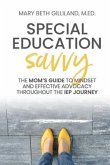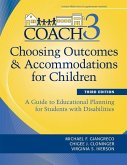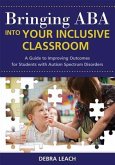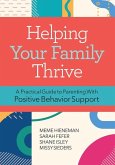Barbara Cutler, Sue Pratt
You, Your Child, and Special Education
A Guide to Dealing with the System, Revised Edition
Barbara Cutler, Sue Pratt
You, Your Child, and Special Education
A Guide to Dealing with the System, Revised Edition
- Broschiertes Buch
- Merkliste
- Auf die Merkliste
- Bewerten Bewerten
- Teilen
- Produkt teilen
- Produkterinnerung
- Produkterinnerung
Parents will master the special education system and get their child the services they need with this empowering advocacy guide, packed with step-by-step, real-world guidance on everything from classroom observations to conflict resolution.
Andere Kunden interessierten sich auch für
![The Home Visitor's Guidebook The Home Visitor's Guidebook]() Carol KlassThe Home Visitor's Guidebook59,99 €
Carol KlassThe Home Visitor's Guidebook59,99 €![Special Education Savvy Special Education Savvy]() Mary Beth GillilandSpecial Education Savvy15,99 €
Mary Beth GillilandSpecial Education Savvy15,99 €![A Special Education A Special Education]() Dana BuchmanA Special Education19,99 €
Dana BuchmanA Special Education19,99 €![Choosing Outcomes and Accommodations for Children (Coach) Choosing Outcomes and Accommodations for Children (Coach)]() Michael GiangrecoChoosing Outcomes and Accommodations for Children (Coach)55,99 €
Michael GiangrecoChoosing Outcomes and Accommodations for Children (Coach)55,99 €![Bringing ABA Into Your Inclusive Classroom Bringing ABA Into Your Inclusive Classroom]() Debra LeachBringing ABA Into Your Inclusive Classroom37,99 €
Debra LeachBringing ABA Into Your Inclusive Classroom37,99 €![Helping Your Family Thrive Helping Your Family Thrive]() HienemanHelping Your Family Thrive28,99 €
HienemanHelping Your Family Thrive28,99 €![My Child, My Chance: Guarding and Guiding Your Child's Identity in the Chaos of Culture and Sex Education My Child, My Chance: Guarding and Guiding Your Child's Identity in the Chaos of Culture and Sex Education]() Susan ZuidemaMy Child, My Chance: Guarding and Guiding Your Child's Identity in the Chaos of Culture and Sex Education18,99 €
Susan ZuidemaMy Child, My Chance: Guarding and Guiding Your Child's Identity in the Chaos of Culture and Sex Education18,99 €-
-
-
Parents will master the special education system and get their child the services they need with this empowering advocacy guide, packed with step-by-step, real-world guidance on everything from classroom observations to conflict resolution.
Hinweis: Dieser Artikel kann nur an eine deutsche Lieferadresse ausgeliefert werden.
Hinweis: Dieser Artikel kann nur an eine deutsche Lieferadresse ausgeliefert werden.
Produktdetails
- Produktdetails
- Verlag: Brookes Publishing Company
- Revised edition
- Seitenzahl: 312
- Erscheinungstermin: 16. September 2010
- Englisch
- Abmessung: 225mm x 153mm x 17mm
- Gewicht: 426g
- ISBN-13: 9781598571233
- ISBN-10: 1598571230
- Artikelnr.: 30504231
- Herstellerkennzeichnung
- Produktsicherheitsverantwortliche/r
- Europaallee 1
- 36244 Bad Hersfeld
- gpsr@libri.de
- Verlag: Brookes Publishing Company
- Revised edition
- Seitenzahl: 312
- Erscheinungstermin: 16. September 2010
- Englisch
- Abmessung: 225mm x 153mm x 17mm
- Gewicht: 426g
- ISBN-13: 9781598571233
- ISBN-10: 1598571230
- Artikelnr.: 30504231
- Herstellerkennzeichnung
- Produktsicherheitsverantwortliche/r
- Europaallee 1
- 36244 Bad Hersfeld
- gpsr@libri.de
Barbara Coyne Cutler, Ed.D., got her advocacy training the hard way. Divorced and with two small children to raise, she began to search out services for her son with autism. It took her almost 10 years to realize that being a patient, no-trouble-at-all parent was not the way to get attention or services. She learned painfully through her personal experience that a parent has to become vocal, visible, knowledgeable, and relentless in order to become an effective advocate. As a parent of a now middle-age son in continuing need of services, Dr. Cutler has been through the system in the dark days when her small son seemed to have no rights at all through the early days of the educational rights movement and later into the adult service system. From a once quiet and compliant parent she has become a leading advocate for people with disabilities and their families. Aware of deficiencies in systems serving people with disabilities, Dr. Cutler worked on her own professional development, acquiring bachelors and master's degrees from Harvard (where she was also a Merrill Fellow of the Radcliffe Institute) and a doctorate in special education from Boston University. Dr. Cutler has directed educational, supported works and community resource programs, including the Autism National Committee (http: //www.autcom.org), which she serves on now; facilitated the development of a model respite care program; trained parents and professionals in positive behavior support programs; and provided individual consultation in various states to public schools dealing with the needs of students with autism and developmental disabilities. In her more than 30 years of service, she has continued to advocate as a member of boards of service, state, and advocacy organizations including her local Commission on Disability and Regional Developmental Disabilities Council. She has presented throughout the United States, Puerto Rico, and Canada. She has published chapters in various disability-related books and newsletters. Looking back, she realizes that because of her son's disability, her career was chosen for her. "I've made my personal and career decisions by dealing with the crises that parents of children with disabilities learn to expect as part of their daily routine. It's a life that's sometimes harrowing, sometimes rewarding--but never, never dull. I have never regretted my decisions. Without strong parent advocates, our sons and daughters could be overlooked and poorly served." Dr. Cutler lives next door to her son, George, and his wife, Sherrie, and across the street from her son, Robert. The family is often together on weekends and is always available to support each other. Sue Pratt, M.A., has advocated for students with special needs for more than 35 years. She claims she keeps trying to quit, but people like her friend Dr. Cutler and parents in need keep her "keeping on." Ms. Pratt received her bachelor of science degree in elementary education from St. John College in Cleveland, Ohio, and her master of arts in education from Western Michigan in Kalamazoo. She has taught for 11 years and worked for or directed the parent center in Michigan (Citizens Alliance to Uphold Special Education [CAUSE]) for 25 years. Among her accomplishments, she lobbied with great zeal to change the wording in The Individuals with Disabilities Education Act (IDEA) from behavior management to positive behavior support for the 1997 reauthorization. She also worked with the Office of Civil Rights and CAUSE staff to produce the first guide for professionals and parents to obtain services under Section 504 of the Rehabilitation Act for students with disabilities not in special education. Paula F. Goldberg, is executive director of the PACER Center in Minneapolis, MN; http: //www.pacer.org.








